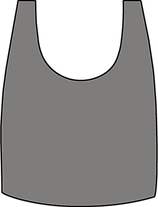
Creating an impact that matters
The garment industry is one of the biggest polluters on the planet. However, at Un-Available, we hope to change that by cultivating a new attitude through planet-forward initiatives.
Our 2020 Sustainability Report provides a retrospect to what we accomplished last year. By highlighting our achievements, things we are working towards, and future goals, we provide an overview of what lies ahead. As our facility continues to shift to tackle our mission, we remain diligent in our cause. And with time being of the essence, there is no room for excuses. It is now about creating a new status quo.
ENERGY
5
% consumption reduction by the end of 2021
WATER
5
% consumption reduction by the end of 2021
CHEMICALS
100
% ZDHC standard in
UnAvailable
MATERIALS
...
% more sustainable materials by the end of 2021
PLASTIC
80
% reduction of single use plastic by 2021
ENERGY
15
% consumption reduction by the end of 2023
WATER
15
% consumption reduction by the end of 2023
CHEMICALS
100
% ZDHC standard within our suppliers by 2023
MATERIALS
...
% more sustainable materials by the end of 2023
PLASTIC
0
% reduction of single use plastic by 2023

[ENERGY]

0.67 kW/garment
0.72 kW/garment
0.76 kW/garment
2018
2019
2020
2021
2022
2023
0.67kWh/garment (*)
We use the Higg Index to track our energy consumption
*Data of 2023




SOLAR SYSTEM
installed

Our goal is to have a 25% reduction in energy consumption by 2025 compared to 2022.

[WATER]
Our water per garment usage remains consistent at 0,01 m3/garment (*)
from May – December 2020
10 L

(*) 10 liters/ garment only refers to the water used at our facility and excludes washing and dyeing processes from our suppliers. Calculation using Higg FEM Baseline Methodology

CONDUCTING
regular audits

WORKING
with local government

ENGAGING
stakesholders

WATER METER
tracking

Our goal is to have a 25% reduction in water consumption by 2025.
We plan to introduce a wasterwater treatment system.

Factory's Wastewater
Raw Wastewater
01 Our facility's raw wastewater goes through our pre-treatment plant before entering the central treatment plant.

01
Supplier's owned pre-treatment plant
Sludge
02
Safe disposal
Discharge Wastewater

03
Central or Common Effluent Treatment Plant (CETP)
03 The final wastewater treatment happens at the central or common effluent processing plant.
02 During the pre-treatment process, sludge, a solid by product, will occur. A waste company collects the sludge for disposal.

04
Aquatic body
04 Once the process is complete, the plant releases the water directly into the environment.

[CHEMICALS]
We refer to the Zero Discharge of Hazardous Chemicals (ZDHC) and OEKO-TEX requirements. The ZDHC is a group consisting of brands and retailers working towards a zero discharge of hazardous chemicals

Our goal is to comply 100% with the ZDHC MRSL 2.0 Standard within our supply chain by 2023

[MATERIALS]


We developed our own scoring system to identify the environmental impact of each process required to produce a garment
We sourced GOTS-certified fabrics and recycled fabrics to use for our clients' production


We worked with our suppliers to source eco-friendly fabrics made from linen, hemp, bamboo, and coffee grounds.
At Un-Available, our goal is to create a business model based on a circular economy, which aims to create value at every step of the production process.
To achieve this, we will work with our suppliers to focus on the reusability of raw materials and products.
Circular Economy Resource Supply
Recycle
Reduce
Reuse

Minimal leakage

[PLASTIC]


48.2 %
51.8 %
2018


42.9 %
57.1 %
2019


27.6 %
72.4 %
2020
Plastic bag usage
Plastic bag wastage
Plastic bag waste created during production for storing fabric, panels, and garments, cannot be re-used because they are broken or deteriorated. Plastic bags for internal use are for storing fabric, panels, and garments.



FABRIC BAGS
to replace poly bags

Our goal is to have 0% plastic bag wastage by 2023 internally and amongst our supply chain

[SUPPLY CHAIN]
OEKO-TEX AND ISO 9001 STANDARDS FOR OUR SUPPLIERS
Subcontractors
Fabric Suppliers
Trim Suppliers






65%
35%
44%
56%
25%
75%
Certified (ISO 9001)
Non-certified (ISO 9001)
Certified (OEKO-TEX)
Non-certified OEKO-TEX)
Certified (OEKO-TEX)
Non-certified OEKO-TEX)
OEKO-TEX is a product label and certification that confirms the ecological safety of textile and leather goods throughout the different steps of a supply chain.
Certifications we are aiming to achieve to reach our goal of the highest international standard.





Download our [SUSTAINABILITY] report
![[ENERGY] : Solar Power](https://static.wixstatic.com/media/0bca51_ca3e7b77453e483cb7c68a1e82d59d66f002.jpg/v1/fill/w_1280,h_720,enc_auto/file.jpeg 1x, https://static.wixstatic.com/media/0bca51_ca3e7b77453e483cb7c68a1e82d59d66f002.jpg/v1/fill/w_2560,h_1440,enc_auto/file.jpeg 2x, https://static.wixstatic.com/media/0bca51_ca3e7b77453e483cb7c68a1e82d59d66f002.jpg/v1/fill/w_3840,h_2160,enc_auto/file.jpeg 3x)